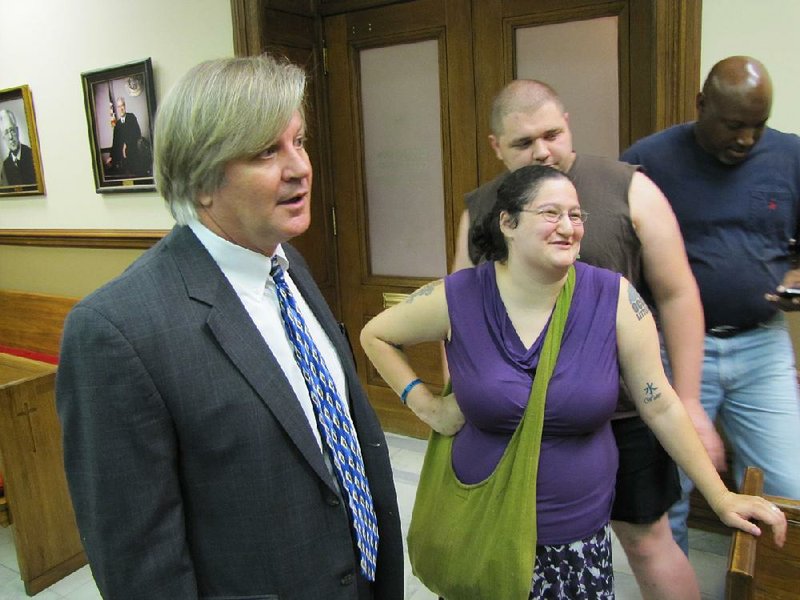A lawsuit filed in Pulaski County on Thursday seeks to knock Issue 1 off the November ballot, alleging that the proposal put forward by the Legislature is an illegal amalgamation of changes to the state constitution.
The filing is the first legal maneuver against Issue 1, a proposal pitched as "tort reform" but cast by many attorneys and patients' advocates as an attack on the Arkansas judiciary.
David Couch, one of the Little Rock attorneys who filed the suit on behalf of former Pulaski County Circuit Judge Marion Humphrey, alleged that Issue 1 is essentially four different amendments that voters will have only a single choice on.
Referred by lawmakers during the 2017 session, Issue 1 proposes to amend the Arkansas Constitution by placing a cap on attorneys' fees; placing another cap on noneconomic and punitive damages; and giving the Legislature, instead of the Arkansas Supreme Court, final rule-making authority over the courts.
The lawsuit also points to a section of the proposed amendment that it says would lower the threshold for the General Assembly to change those rules from a two-thirds vote to a three-fifths vote.
"The four sections have no legal common chord or singular purpose, subject or goal," the lawsuit states.
Proponents of Issue 1, including the state Chamber of Commerce, argue that the changes are part of a package of changes that will help reduce the costs of litigation for businesses and hospitals.
Shortly after the suit was filed, the chamber issued a news release bearing the headline, "Trial lawyers do what they do best -- sue."
Millions of dollars have already been raised by groups planning to campaign on either side of the issue in the fall.
The legislative sponsor of the resolution that became Issue 1, state Rep. Bob Ballinger, R-Hindsville, defended the writing of the amendment, saying it constituted "judicial reform."
"It can be really complicated, it can be really sophisticated," Ballinger said. "That doesn't mean it's not one issue."
Under the state constitution's provisions for amendments, the Legislature may, while meeting in regular session, place up to three proposed amendments on the next general election ballot. Each amendment must get a separate vote. The state's constitution of 1864, in Article 19, Section 22, says amendments "shall be so submitted as to enable the electors to vote on each amendment separately."
Compared with rulings on proposals offered through the initiative process, the courts rarely interfere with proposed amendments put forward by the Legislature, several observers of the initiative process said Thursday.
Two years ago, the Arkansas Supreme Court halted voting on two different amendments that were the subject of lawsuits. One of the stricken proposals, Issue 4, dealt with attorneys' fees and damages specifically in medical malpractice suits.
Each of the stricken amendments was placed on the ballot by citizen petitions. Each of the three amendments referred by the Legislature remained on the 2016 ballot and were passed by voters.
The lawsuit against Issue 1 cites a case in which a legislatively referred amendment in 2010 was challenged on the separate-votes clause, in addition to allegations of "manifest fraud." The argument failed at both the lower court and the Arkansas Supreme Court, which upheld the legislative proposal dealing with interest rates on loans, contracts and bonds and became Amendment 89.
The different provisions of a single amendment must be "reasonably germane to each other" in order to pass constitutional muster, the Arkansas Supreme Court held in that case, Forrester v. Mark Martin.
Couch said Issue 1 violates that standard, and in an emailed statement, Humphrey said the amendment was pulled together by "logrolling."
"That argument is a fairly common one, and one the courts have given the Legislature a lot of deference on," said Ballinger, who is a lawyer.
Couch's lawsuit is against Secretary of State Mark Martin, whose office certifies what amendments get placed on ballots and counts the votes. It seeks a writ of mandamus that would force the ballots to be printed without Issue 1, or if the amendment is put before voters, to quash the counting of votes.
Upon being filed in Pulaski County Circuit Court, the lawsuit was initially assigned to Circuit Judge Alice Gray, who had been represented by Couch in a previous lawsuit. Gray immediately recused, and a new judge has yet to be appointed.
At the Supreme Court, where an appeal of any decision is likely to head, Chief Justice Dan Kemp has spoken out on behalf of the judiciary against Issue 1.
Addressing the Arkansas Bar Association last month, Kemp said he would personally vote against Issue 1 if it reaches the ballot in November, though he added that his comments did not signal how he would rule on any lawsuit over the issue.
Other justices have declined to comment on Issue 1, citing the likelihood of a suit.
Issue 1 is one of two legislative proposals for the ballot. The other is on voter ID. The secretary of state's office is now evaluating signatures on petitions for other proposals on term limits, casinos and the minimum wage.
A Section on 07/13/2018

